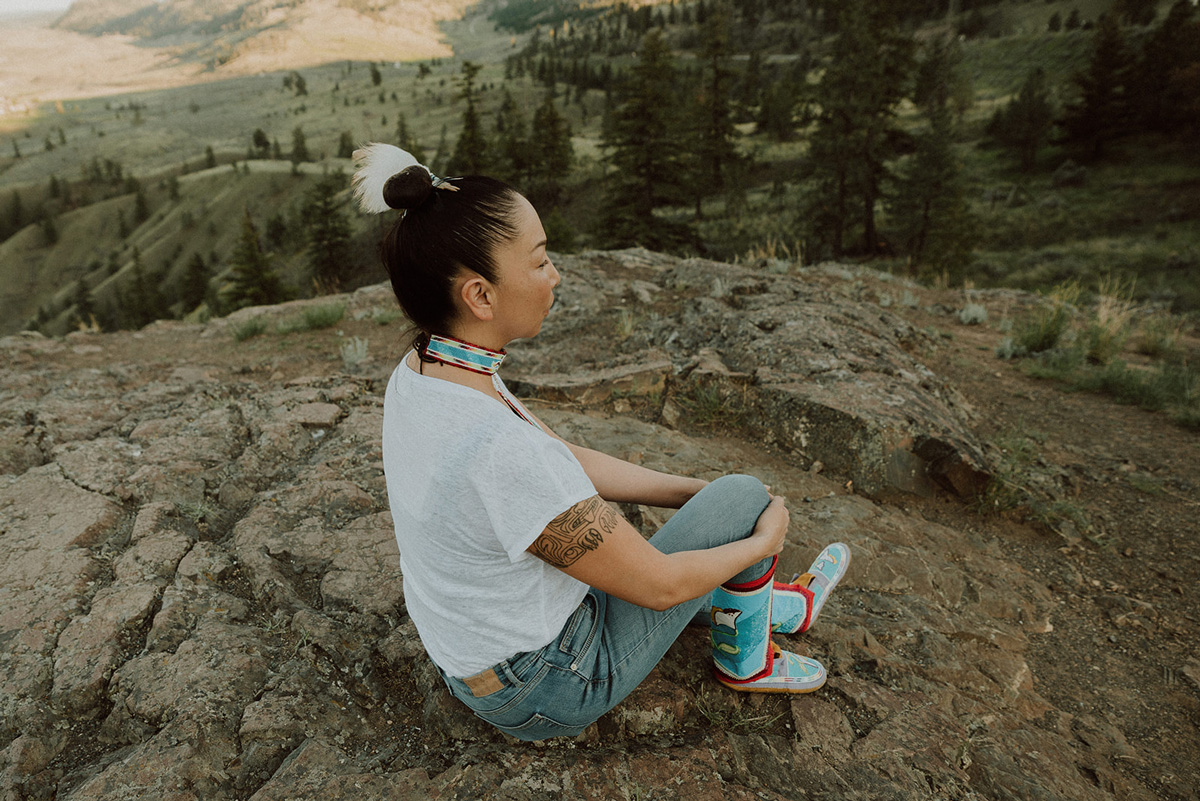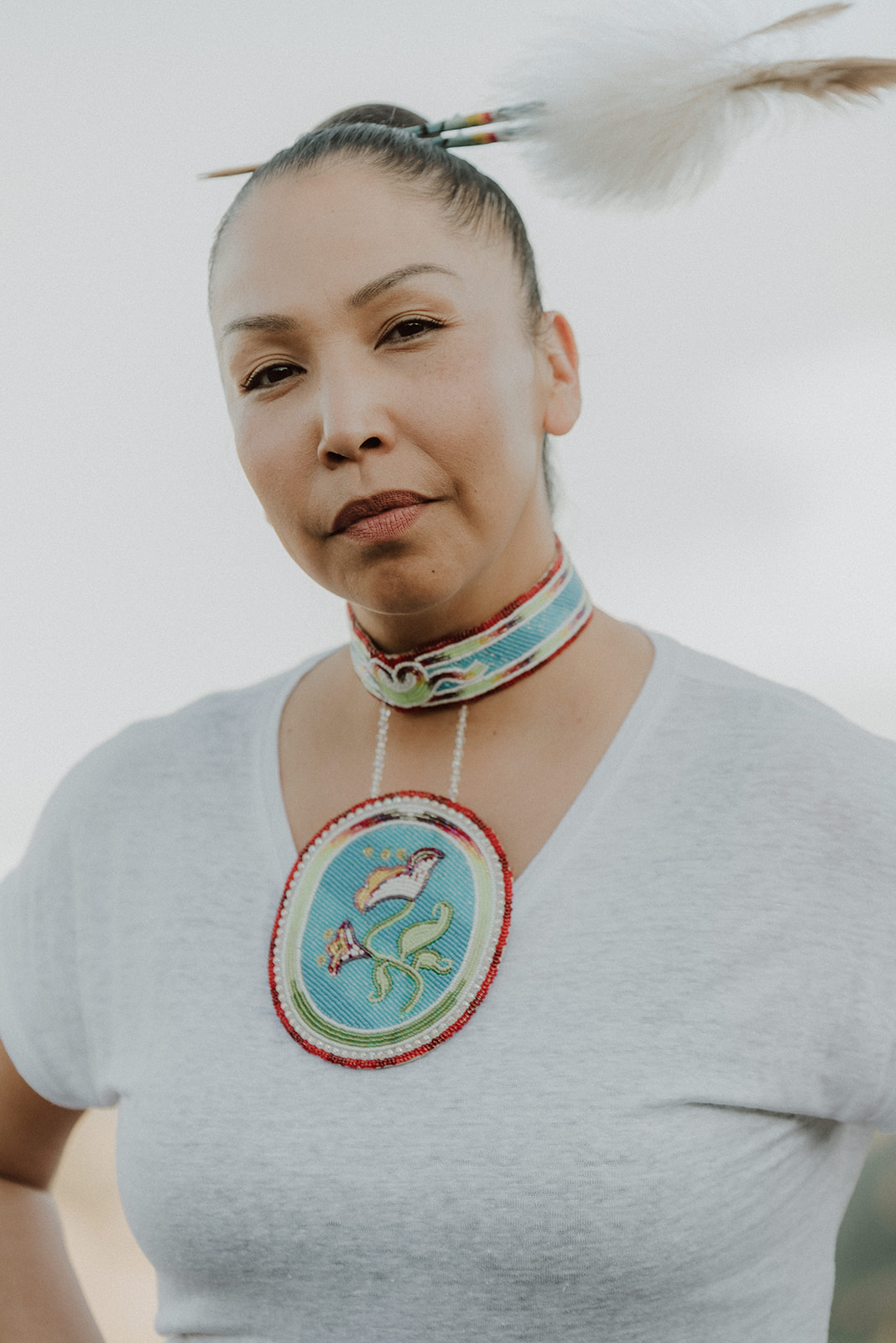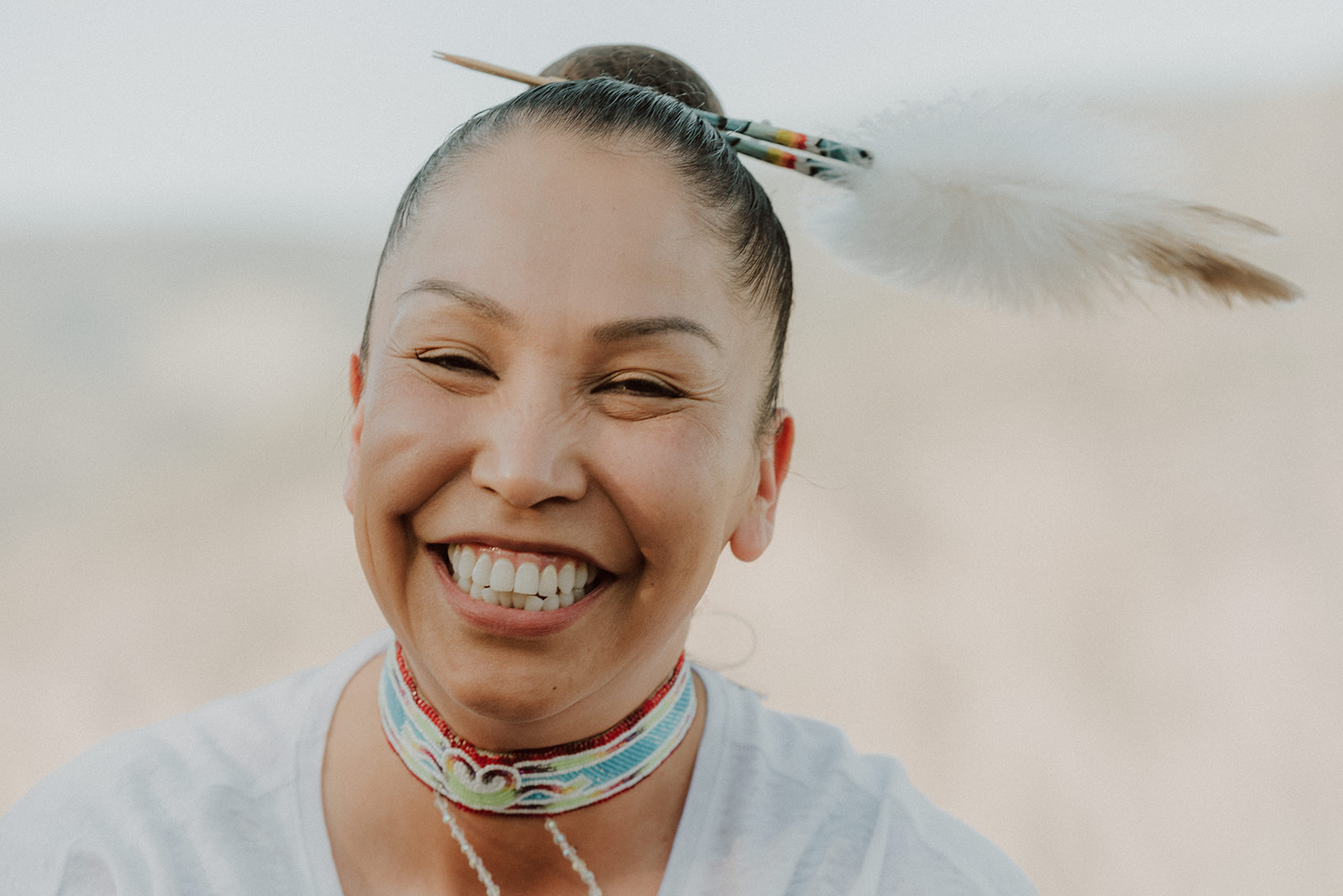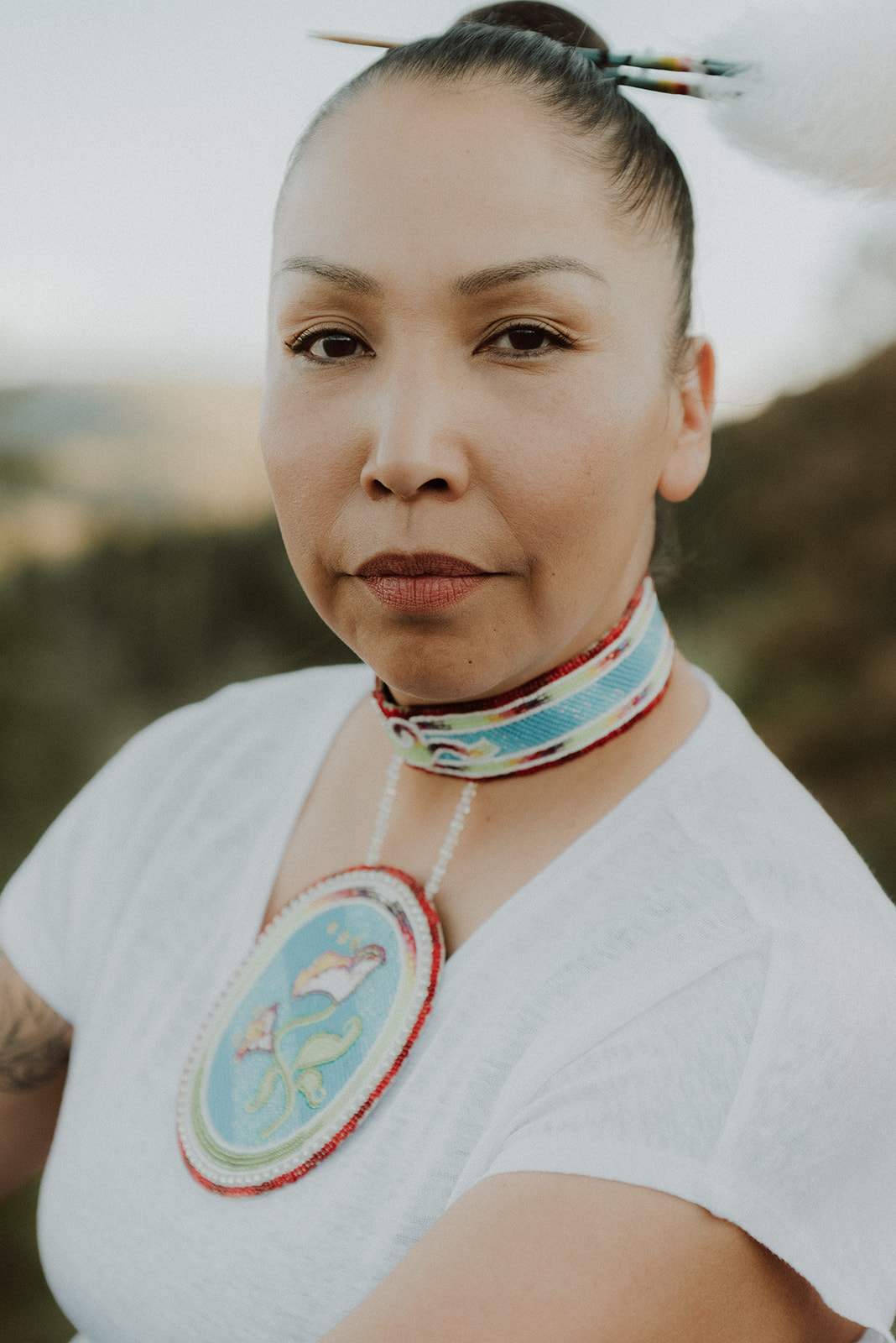
In conversation with Elaine Alec, author, entrepreneur, and Ch’nook Aboriginal Management Program alum

All photos by Billie Jean Gabriel Photography
When Elaine Alec set out to write her debut book, Calling My Spirit Back, she was told she could expect to sell 250 copies as a self-published author. She set a goal of 1,000 and sat down and wrote the first draft in just 29 days. Released in 2020, Alec’s book resonated with readers and received five-star reviews. She quit counting when sales hit the 13,000 mark.
A graduate of the Ch’nook Aboriginal Management Program (AMP) (’12) at the UBC Sauder School of Business, Alec is also a facilitator and business owner. Earlier this year, she founded Naqsmist (nux-meest), a company that focuses on transformative storytelling and whole-systems healing. Through its transformative strategy sessions, training programs, and workshops, Naqsmist provides tools and processes to promote maximum efficiency in decision-making and strategy.

Alec is from the Syilx and Secwepemc Nations and is a member of the Penticton Indian Band. In her new role as founder and owner of Naqsmist, which translates into “many coming together as one,” she is building on her long history of community impact.
Alec has spent more than two decades promoting healing and wellness in communities across Canada and has become a nationally-recognized thought leader in Indigenous planning processes. She was recently named the winner of BCBusiness Magazine’s 2023 Women of the Year Award for Equity and Inclusion Champion.
Alec sat down to discuss the long-term vision of her new venture, her experience as an AMP student, the inspiration behind her book, and why she’s been able to captivate audiences through her powerful writing.

-
Q: In 2020, you published your first book, Calling My Spirit Back. Can you tell us about the book and what inspired you to write it?
A: “I’ve known I was going to write a book ever since I was 10 years old. When I was in my early 20s, I thought it would be based loosely on my life, but with controlled messaging. We like to make ourselves the hero in our own stories and that was my approach. Back then, I could never finish the book and I realized why when I finally did write this book. I wasn’t the hero and I wasn’t the victim. It was really important that I wrote it from a place of love and not anger, hurt, or pain. I wanted to write the book from the scar, not the wound.
Over the summer of 2019, I travelled to 12 different parts of the province talking about missing and murdered women and the violence happening in our communities. One thing that came out was that we don’t have enough training and resources written from a decolonized approach. We don’t have enough training and resources for our own people to deliver this work – ways that we see ourselves in, ways that come from ceremony. I thought this book could be a guide for facilitators who want to do this work.
The other thing that stood out was the answer to the violence and trauma in our communities is coming of age work. It didn’t matter which part of the province I was in, that is what the knowledge keepers, language speakers, and elders said. That was the foundation from which I started to write the book.
I sat in circle over that summer and heard story after story after story. I no longer felt that I wanted to write a book, I now felt a responsibility to write it.”

-
Q: As a successful self-published author, what is the key to captivating an audience as a storyteller?
A: “Writing from the heart, with rigorous honesty and vulnerability. I talk about the things that a lot of us don’t want to admit. Everybody has gone through so many different things that we try to hide because we feel shame. Shame is a colonial tool to control us, and silence contributes to shame. We are taught things like, ‘We don’t talk about that, we don’t act like that, this is a professional space.’ That is what upholds the oppression and upholds the control of us.
In colonialism, there is good or bad; there is right or wrong. Whereas in our teachings, we are both good and bad; we are both right and wrong. We are human beings and we have all of these things in us. By being rigorously honest with myself first, it gives permission to other people to be rigorously honest with themselves so they can show up as who they are.”

-
Q: What do you consider to be your greatest accomplishment?
A: “My greatest accomplishment has been my sobriety. I will be 16 years sober this year. I would not be successful in business and I would not be a good mother, a good friend, or a good partner without my sobriety. Sobriety is the core success of everything that I am and do. That is what I have to focus on first and foremost, before everything else.
I drank because of trauma so sobriety required a lot of hard work. In order to maintain sobriety, it required understanding of self, and confidence and love for self, and those are all things required to be a good entrepreneur and business person. It wasn’t until I got sober that all of these things in my life started to flourish and I was able to make money, to prosper, and to redistribute that wealth among my family and our communities.”

-
Q: You launched Naqsmist in February of this year. Can you tell us about your new venture?
A: “I took my individual sole proprietorship, Elaine Alec – Writer & Speaker, which housed my book, my keynotes, and my trainings and renamed it Naqsmist. My entire family works with me at Naqsmist, along with a couple of other folks who came to support the work that we’re doing. We work with communities, organizations, and governments to work through the trauma, grief, and all of the mental health issues that have become amplified since the COVID-19 pandemic.
We’re having a really hard time navigating decision-making spaces because we are constantly being triggered and working from trauma and it’s impacting our relationships at various levels. At Naqsmist, our focus is on helping people learn how to regulate and co-regulate so that they are able to work from their executive brains to make good decisions despite the triggers, trauma, and things happening in the world today. Working from that place of trust, as opposed to working from that place of fear.”

-
Q: What kind of impact do you hope Naqsmist has? What is your long-term vision for the company?
A: “Self-determination. What we want to accomplish is for all human beings to understand and feel what self-determination is, which is trusting self. It is not just Indigenous peoples who need to remember that feeling, it is all humans. If we don’t, we’re going to continue upholding the system of oppression. The focus of this company is many coming together as one – all minds, all thinking, all people coming together as one to move forward towards that vision of self-determination. This company is based in systems-thinking work, meaning the work we do with others is the work we have to do ourselves.”

-
Q: How did the Ch’nook Aboriginal Management Program (AMP) help you to advance your career and your goals?
A: “I always knew I wanted to get into business. I have been a business person my entire life. I have always had the instinct to know how to make money and provide for my family. I always found creative ways to do that. I attempted many times to apply for business schools but I couldn’t meet the minimum requirements to get into a university. When I applied to Ch’nook AMP, it was one of the most validating experiences I’ve had because I knew I was on the right track.
The teachers who we worked with were amazing. I was really up front and honest with them about my level of understanding around numbers and finance, which is where I struggled the most. They really helped me understand the reasoning behind why and how I should learn. That changed my whole perspective in numbers, finance, and math and how I work with people in business. It built the strong foundation and confidence in myself.”
Learn more about Naqsmist, the Ch’nook Aboriginal Management Program, and Ch’nook Indigenous Business Education.